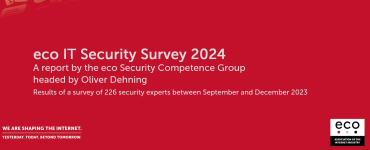- eco Association gives 8 tips for protection against fake shops
- Many online shops insufficiently protect themselves against domain abuse
- Take supposed super bargains as warning signals
Fueled by the Covid-19 pandemic, experts expect record online retail sales for the 2021 holiday season. Unfortunately, this is also the high season for cyber criminals who lure bargain hunters themselves with fake shops. Fake shops are fake online shops that imitate legitimate offers. They often use stolen images and false seals of approval to gain the trust of customers. The prices are significantly lower than in other shops.
How these shops are created is being investigated by the Research project INSPECTION of the German Federal Ministry of Education and Research (BMBF) in cooperation with eco Association of the Internet Industry: Criminals exploit vulnerabilities in websites – for example, missing updates in the content management system – and generate manipulated websites under the original domain name. By accessing these pages, buyers are automatically redirected to a fake shop or other forms of abuse.
Take low prices as a warning signal
“As copies of real websites, fake shops are very difficult to recognise,” says Markus Schaffrin, security expert and head of the Member Services division at eco – Association of the Internet Industry. “At first glance, the sites appear reputable and offer a professional appearance.” Those who do not pay attention to warning signs in view of low prices may receive substandard goods or fail to receive the delivery at all. If you try to visit the shop later again, you will find that it has been closed in the meantime. Fake shops are usually only online for a short time, then go off the Internet and reappear elsewhere after a short time.
“We recommend customers to do a short background research even if they have slight doubts in order to unmask fake shops,” Markus Schaffrin explains. “The name, Internet address and also the information in the legal notice make it easy to research what experiences other customers have had with the provider in question.”
The eco Association recommends healthy distrust if a shop does not meet the requirements mentioned below.
- Does the Internet address include a well-known top-level domain (TLD), such as .de, .com or .info? Consumers should be wary of inconsistencies such as extensions of “.de” to “.de.com”.
- Is data transmitted to the website encrypted? Whether a shop transmits encrypted data can be recognised in the browser by the lock symbol and the https URL.
- Are different payment methods offered? Many fake shops offer several methods of payment but only offer payment in advance, for example in the form of a bank transfer, when the order is actually placed. This is not a good option for consumers because it is difficult to reclaim transfers.
- Are the prices realistic? Consumers should be wary of bargains that are too good to be true. If in doubt, opt for a payment method that also includes buyer protection.
- Is the legal notice complete? In the case of fake shops, the legal notice often does not contain any information about the provider or important information such as address, authorised representative, email address or reference to the commercial register is missing.
- Are there also critical or neutral customer reviews? Only praise within the shop should make you wonder. Also, look for testimonials and reviews of the shop in question on other sites.
- Are there general terms and conditions and are they written in good German? If the terms and conditions are copied from other sites, written in bad German or missing altogether, this is a warning signal.
- Are the mentioned quality seals linked to the awarding body of the seal? If not, then the shop is possibly adorning itself with invented seals of approval without any real significance or is using real seals of approval without possessing a corresponding certificate.
“If there is uncertainty as to whether a shop is reputable or not, consumers should look elsewhere on the Internet for the desired item,” says Markus Schaffrin in his conclusion.
Further information on fake shops from the NRW consumer advice centre.




